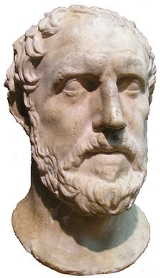
Θουκυδίδης, Thoukydídēs) was a Greek
historian
and author from Alimos
. His History of the Peloponnesian War
recounts the 5th century BC war
between Sparta
and Athens
to the year 411 BC. Thucydides has been dubbed the father of "scientific history", because of his strict standards of evidence-gathering and analysis in terms of cause and effect without reference to intervention by the gods, as outlined in his introduction to his work.
He has also been called the father of the school of political realism, which views the relations between nations as based on might rather than right.
I have written my work, not as an essay which is to win the applause of the moment, but as a possession for all time. ![]()
Abstinence from all injustice to other first-rate powers is a greater tower of strength than anything that can be gained by the sacrifice of permanent tranquillity for an apparent temporary advantage.![]()
When one is deprived of ones liberty, one is right in blaming not so much the man who puts the shackles on as the one who had the power to prevent him, but did not use it. ![]()
In practice we always base our preparations against an enemy on the assumption that his plans are good; indeed, it is right to rest our hopes not on a belief in his blunders, but on the soundness of our provisions. Nor ought we to believe that there is much difference between man and man, but to think that the superiority lies with him who is reared in the severest school. ![]()
The country on the sea coast, now called Macedonia, was first acquired by Alexander, the father of Perdiccas, and his ancestors, originally Temenids from Argos...The whole is now called Macedonia, and at the time of the invasion of Sitalces, Perdiccas, Alexander's son, was the reigning king.![]()
There is, however, no advantage in reflections on the past further than may be of service to the present. For the future we must provide by maintaining what the present gives us and redoubling our efforts; it is hereditary to us to win virtue as the fruit of labour, and you must not change the habit, even though you should have a slight advantage in wealth and resources; for it is not right that what was won in want should be lost in plenty.![]()
If you give way, you will instantly have to meet some greater demand, as having been frightened into obedience in the first instance; while a firm refusal will make them clearly understand that they must treat you more as equals. ![]()
It is from the greatest dangers that the greatest glory is to be won. ![]()

